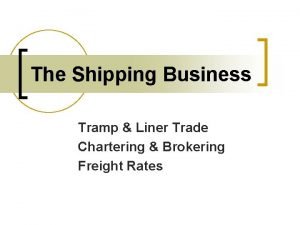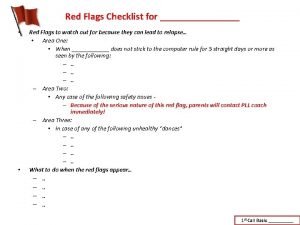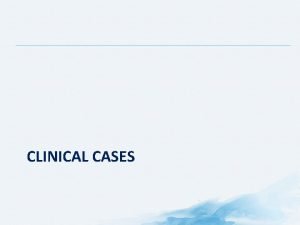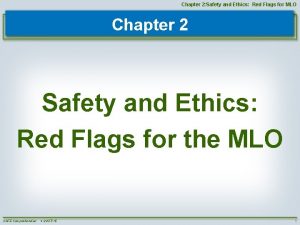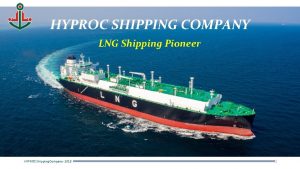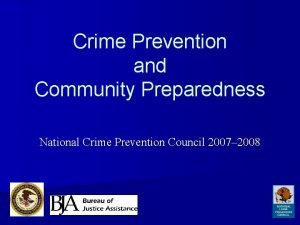SHIPPING SANCTIONS AND CRIME RED FLAGS PREVENTION AND









- Slides: 9

SHIPPING, SANCTIONS AND CRIME RED FLAGS, PREVENTION AND DETECTION MAY 2020

On 14 May 2020, 3 US Government agencies – The US Treasury State Department US Coast Guard SHIPPING, SANCTIONS AND CRIME issued a joint Sanctions Advisory which was designed, in large part, to provide those engaged or involved in trade in the maritime industry with further information and tools to counter current and emerging trends related to illicit shipping and sanctions evasion. These slides set out to summarise the Red Flags and advice on how to detect and prevent illicit activity associated with sanctions violations.

NOT JUST FOR THE US NOR JUST FOR SANCTIONS SHIPPING, SANCTIONS AND CRIME While the Advisory, and the factors identified in these slides, are chiefly aimed at the risk of shipping being involved in breaches of sanctions imposed by the US authorities, the advice has general applicability. The UN and EU, as well as individual countries, including the UK, Australia and Canada, impose trade and economic sanctions. One should also be aware of export controls imposed by the US, EU and others, as well as trade controls (on trafficking and brokering) of certain goods, such as military goods; as well as other illicit activities including smuggling, human trafficking, and illegal unreported and unregulated (IUU) fishing.

THE RED FLAGS SHIPPING, SANCTIONS AND CRIME ØDISABLING OR MANIPULATING THE AUTOMATIC IDENTIFICATION SYSTEM (AIS) ØPHYSICALLY ALTERING VESSEL IDENTIFICATION (name, IMO number etc) ØFALSIFYING CARGO AND VESSEL DOCUMENTS ØINVOLVEMENT IN SHIP-TO-SHIP (STS) TRANSFERS ØVOYAGE IRREGULARITIES (irregular routing, diversions (ship or cargo), delays) ØFALSE FLAGS (non-existent ship registries or use of flags when not registered) ØFLAG HOPPING (frequent changing from one register to another) ØCOMPLEX OWNERSHIP OR MANAGEMENT STRUCTURES (including shell or offshore companies)

METHODS FOR IDENTIFYING SANCTIONS EVASION • Have a sanctions compliance programme • Adopt risk assessment systems and assess the risks faced • Use KYC and due diligence checks on all parties SHIPPING, SANCTIONS AND CRIME • Adopt and encourage AIS good practice and investigate irregularities • Monitor use of ships, their acquisition, use and disposal • Include requirements for best practice in contracts, agreements etc • Share information with counterparts, regulators, law enforcement • Stay up to date with sanctions developments, news of illicit activity

AIS AND ROUTING CHECKS SHIPPING, SANCTIONS AND CRIME • Look out for AIS transmission breaks and unexplained loss of signal • Be alert to unexplained deviation from normal/planned routes • Query visits to areas of concern and/or sanctioned destinations • Carry out cyclical checks on ships’ AIS records • Monitor commercial databases on ship/owners’ activities • Use commercial databases analysing AIS irregularities

RISK ASSESSMENT SHIPPING, SANCTIONS AND CRIME • Examine each area of business separately, reassess regularly • Assess and assign risk (high, medium, low) for each area • Identify and record preventive/mitigation measures adopted • Record decisions made, queries raised and the results • Understand the commercial rationale for the client, customer, business • Refer concerns to regulator, law enforcement, FIU • Exchange information (as permitted by law) with counterparts • Keep up to date with developments, trends, red flags, typologies etc

DUE DILIGENCE • Checks on ship owners and beneficial owners, agents and managers • Verify IMO numbers, flag registrations, company registrations etc SHIPPING, SANCTIONS AND CRIME • Verify authenticity of documents submitted • Query complex management/ownership structures • Why are offshore jurisdictions and/or shell companies involved? • Conduct cyclical checks on companies and on AIS records for vessels • Monitor commercial databases for details of ship/owner activities • Monitor news services for updates on sanctions and for reports of illicit activity

TRAINING AND AWARENESS IS VITAL Training of all staff involved in awareness of risks is essential SHIPPING, SANCTIONS AND CRIME Have a responsible person or persons, with sufficient independence or seniority, undertaking the compliance role(s) Use risk assessment to design the type and extent of training required for relevant staff Record training undertaken Continue to monitor commercial databases, trade sources, official sanctions (and export control and related) sources Take part in trade sector or government-sponsored cooperation and exchange programmes

